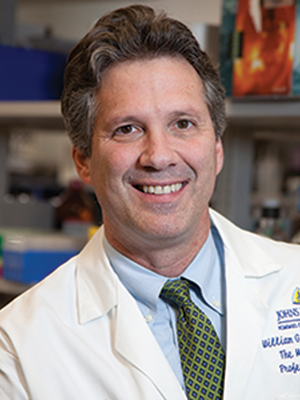
William G. Nelson, MD, PhD Photo by Joe Rubino
One in two men and one in three women in the United States are destined to develop cancer. Why do some people get the disease while others do not?
Cancer cells contain defective genes that drive uncontrolled cell growth, invasion into normal tissues and life-threatening metastasis. Some malfunctioning genes can be inherited, conferring a high risk of cancer that runs in families. Most of the gene defects in cancer cells appear from errors acquired while copying genes, as normal cells are replenished. Other cancer genes can be supplied by viruses, like human papillomavirus (HPV), which can cause cancer in infected cells.
Angelina Jolie Pitt, in a March 24, 2015, New York Times op-ed piece, described inheriting a BRCA1 gene mutation that greatly increased her risk for breast and ovarian cancers. This gene mutation was likely the origin of cancers in some of her family members. To reduce her chance of suffering with cancer, Jolie Pitt elected to have her breasts and ovaries removed. She wrote of how she made a choice that best suited her and her loved ones: “It is not easy to make these decisions. But it is possible to take control and tackle head-on any health issue. You can seek advice, learn about the options and make choices that are right for you. Knowledge is power.” For cancer-prone families, testing for mutations in an inherited cancer susceptibility gene like BRCA1 can help shape strategies to minimize the cancer threat, including prophylactic surgery, intensive cancer screening and an altered lifestyle.
Fortunately, catastrophic genetic mutations that dramatically affect cancer risk across generations of families are rare. Much more commonly, inherited genes exhibit minor differences from one person to another, and some of these variant genes influence the propensity to develop cancer. Studies of cancer in twins illustrate this well. When the risk of developing cancer is compared between identical twins, who share all of their genes, and fraternal twins, who share half of their genes, an excess of cancer in identical twins strongly suggests an inherited predisposition to cancer. Analyses of cancer in twins reveal that for many common cancers—for example, breast, prostate, and colon and rectum—inheritance is a strong contributor (as much as 40 percent or more of such cancers).
All cancer cells carry acquired gene defects, as mistakes in copying DNA sequences accumulate during the generation of normal cells to replace old ones. Cristian Tomasetti and Bert Vogelstein reported in the Jan. 2, 2015, Science that these errors might be responsible for as much as 65 percent of the variation in cancer risk. Their estimate was based on the high correlation between the number of cell divisions in different organs and the lifetime risk for developing cancer at those organ sites. For example, the small intestine undergoes less cell renewal than the colon and is less likely to develop cancer. Since most mistakes in DNA replication do not lead to cancer gene defects, the chance that cancer might arise via a copy error was considered “bad luck.”
Cancer genes also can be damaged by a variety of exposures—including carcinogens in tobacco smoke, overcooked meats and workplace exposures—and by chronic or recurrent inflammation. The impact of environmental exposures on cancer has been assessed by comparing cancer incidence and mortality rates in different parts of the world. As an example, breast and prostate cancers are common in the U.S. but relatively rare in Asia. In contrast, stomach and liver cancers are common in Asia but rare in the U.S. The notion that environment and lifestyle might account for these differences is buttressed by the tendency of Asian-born immigrants to the U.S. and their U.S.-born children to show lower risks of stomach and liver cancers and higher risks of prostate cancer. An estimated 70 to 80 percent of cancers may be caused by avoidable exposures.
How can 40 percent of cancer cases be attributed to inheritance, 65 percent to “bad luck” DNA replication errors and 70 to 80 percent to exposures? There must be a complex interplay among inheritance, the environment and “bad luck.” Jolie Pitt’s contention that knowledge is power remains apropos. For members of high-cancer-risk families, knowing whether defective genes have been inherited can inform decisions about interventions to reduce cancer risk. For the rest of us, knowing the hazards of cigarette smoking, alcohol abuse, obesity and poor diet should drive us to make healthier choices. The power of this knowledge will hopefully permit us to minimize the ravages of “bad luck” and reduce the threat of cancer.
Cancer Today magazine is free to cancer patients, survivors and caregivers who live in the U.S. Subscribe here to receive four issues per year.




